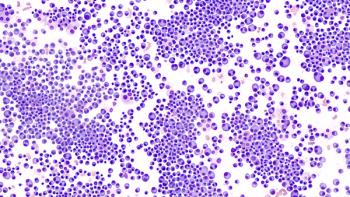
Prompt Treatment of CAR T-Cell Therapy-Related AEs Can Prevent Long-Term Lasting Effects
Data presented at the European Hematology Association 2021 Virtual Meeting revealed that CAR T-cell therapy-related adverse effects can be managed.
Data from CARTITUDE-2 suggests that patients with relapsed/refractory multiple myeloma who experience adverse events (AEs) as a result of CAR T-cell therapies such as ciltacabtagene autoleucel (Cilta-cel or JNJ-68284528) can manage those symptoms without long-term lasting effects, so long as they are caught and treated promptly.
“To date, more than 100 patients across the CARTITUDE study program have been dosed with cilta-cel. So when implemented, patient management strategies have reduced the incidence of neurotoxicity, including movement and neurocognitive events,” said Hermann Einsele, MD, FRCP, professor of internal medicine at the Julius Maximillians University of Würzburg in Germany, while presenting the study findings.
The open-label, phase 2, multicohort CARTITUDE-2 (NCT04133636) trial evaluated the efficacy and safety of cilta-cel in patients with myeloma. For the purpose of studying AEs, the researchers analyzed cohort A, which involved patients with myeloma that progressed after 1-3 lines of therapy, including a proteasome inhibitor and an immunomodulary drug.
Eligible patients were adults with measurable disease and ECOG performance status of 0 or 1. Their disease was refractory to lenalidomide (Revlimid) and was not previously treated with another BCMA-targeted drug.
Patients received cilta-cel (0.75×10 6 [range: 0.5–1.0×10 6] CAR+ viable T cells/kg) as a single infusion 5–7 days after the initiation of lymphodepletion (cyclophosphamide 300 mg/m2 + fludarabine 30 mg/m2 daily for 3 days).
“Patient management strategies included more effective bridging therapy to reduce baseline tumor burden, early aggressive treatment of [cytokine release syndrome] and [immune effector cell-associated neurotoxicity], as well as handwriting assessment for early detection of symptoms of neurotoxicity,” Einsele said. “These strategies have been successfully implemented across the CARTITUDE proves.”
At a median follow-up of 5.8 months (range, 2.5-9.8 months), 20 patients in cohort A received cilta-cell, and 4 (20%) experienced at least 1 neurotoxicity. Three patients had grade 1/2 immune effector cell-associated neurotoxicity (ICANS) alongside cytokine release syndrome. The median time to symptom onset was 8 days (range, 7-11), and, on average, symptoms lasted 2 days. Two patients received supportive measure for their ICANS, including levetiracetam and steroids.
There was 1 patient who experienced isolated grade 2 facial paralysis on day 29. The patient recovered 51 days later after being treated with dexamethasone for 28 days. Overall, there were no movement or neurocognitive disorders that were reported within Cohort A of the study.
“Importantly, none of the patients in the cohort A of the CARTITUDE study experienced other neurotoxicities that were seen in CARTITUDE-1,” Einsele said.
Reference
- Einsele H, Parekh S, Madduri D, et al. Incidence, mitigation, and management of neurologic adverse events in the phase 2 CARTITUDE-2 study of ciltacabtagene autoleucel in patients with multiple myeloma. Presented at: 2021 European Hematology Association Congress. June 9-17, 2021. Virtual. Abstract EP1003.
Newsletter
Knowledge is power. Don’t miss the most recent breakthroughs in cancer care.































































































